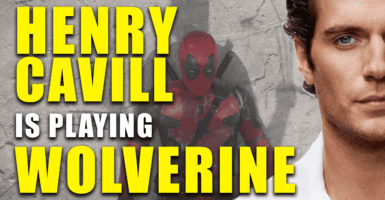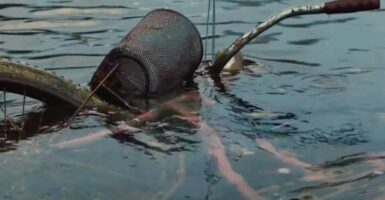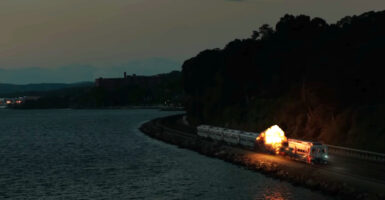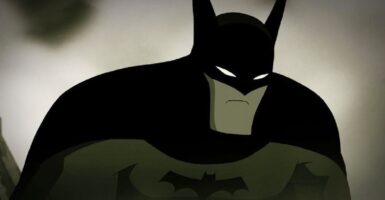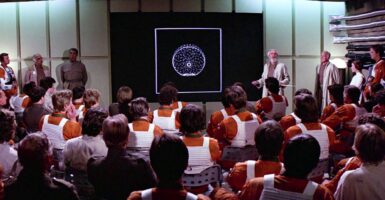Clarke Awards Nominate The Year’s Best Science Fiction Lit, Author Calls It A Poor Year
This article is more than 2 years old
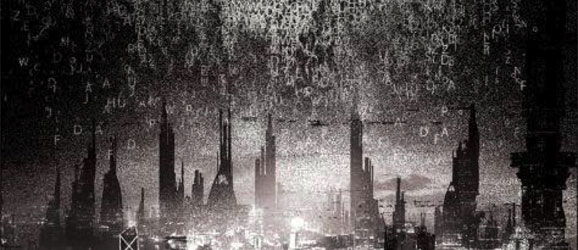 Named for the great Arthur C. Clarke, in theory the Clarke Awards recognize the year’s best accomplishments in science fiction. This year’s shortlist of nominees have been announced and, one author has come out against the whole thing.
Named for the great Arthur C. Clarke, in theory the Clarke Awards recognize the year’s best accomplishments in science fiction. This year’s shortlist of nominees have been announced and, one author has come out against the whole thing.
First the nominees which, I must confess, even though I read a lot of science fiction I’ve missed all of them. Hopefully you’ve done better. Here’s the 2012 Clarke Award shortlist with a quick synopsis of what each book is about…
Greg Bear, Hull Zero Three
SYNOPSIS: A starship hurtles through the emptiness of space. Its destination-unknown. Its purpose-a mystery. Now, one man wakes up. Ripped from a dream of a new home-a new planet and the woman he was meant to love in his arms-he finds himself wet, naked, and freezing to death. The dark halls are full of monsters but trusting other survivors he meets might be the greater danger. All he has are questions– Who is he? Where are they going? What happened to the dream of a new life? What happened to Hull 03? All will be answered, if he can survive the ship.
Drew Magary, The End Specialist
SYNOPSIS: 2019. Humanity has witnessed its greatest scientific breakthrough yet: the cure for ageing. Three injections and you’re immortal – not bulletproof or disease-proof but you’ll never have to fear death by old age. A gripping, compulsive thriller set in a future where the cure for ageing has been discovered… to devastating consequences
China Miéville, Embassytown
SYNOPSIS: In the far future, humans have colonized a distant planet, home to the enigmatic Ariekei, sentient beings famed for a language unique in the universe, one that only a few altered human ambassadors can speak. Avice Benner Cho, a human colonist, has returned to Embassytown after years of deep-space adventure. She cannot speak the Ariekei tongue, but she is an indelible part of it, having long ago been made a figure of speech, a living simile in their language. When distant political machinations deliver a new ambassador to Arieka, the fragile equilibrium between humans and aliens is violently upset. Catastrophe looms, and Avice is torn between competing loyalties—to a husband she no longer loves, to a system she no longer trusts, and to her place in a language she cannot speak yet speaks through her.
Jane Rogers, The Testament of Jessie Lamb
SYNOPSIS: Women are dying in their millions. Some blame scientists, some see the hand of God, some see human arrogance reaping the punishment it deserves. Jessie Lamb is an ordinary girl living in extraordinary times: as her world collapses, her idealism and courage drive her towards the ultimate act of heroism. If the human race is to survive, it’s up to her.But is Jessie heroic? Or is she, as her father fears, impressionable, innocent, incapable of understanding where her actions will lead? Set just a month or two in the future, in a world irreparably altered by an act of biological terrorism, The Testament of Jessie Lamb explores a young woman’s determination to make her life count for something, as the certainties of her childhood are ripped apart.
Charles Stross, Rule 34
SYNOPSIS: Detective Inspector Liz Kavanaugh is head of the Rule 34 Squad, monitoring the Internet to determine whether people are engaging in harmless fantasies or illegal activities. Three ex-con spammers have been murdered, and Liz must uncover the link between them before these homicides go viral.
Sheri S.Tepper, The Waters Rising
SYNOPSIS: Long ago was the “Big Kill,” horrible, apocalyptic events that destroyed nearly every living thing on earth. Since then the last of humankind has scattered into widespread small kingdoms separated by superstition, war, and fear. And now, while facing a natural catastrophe that threatens to drown a world, an ancient evil resurfaces and may prevent any chance of survival. With the future of humankind at stake, a small band of disparate characters—a lonely child, a loyal servant, a mysterious wanderer, and a most unusual horse—sets out on a journey fraught with peril and wonder . . . a sacred mission that leaves no room for failure.
How many of those six books have you read? Author Christopher Priest has read all of them… and hates most of them.
Priest is a Hugo award nominated author and he’s not shy about sharing his opinions. He spoke out about the 2012 Clarke Awards on his blog saying, “It seems to me that 2011 was a poor year for science fiction. Of the sixty books submitted by publishers, only a tiny handful were suitable for awards. The brutal reality is that there were fewer than the six needed for the Clarke shortlist. Many of the submissions were fantasy of the least ambitious type, and many of the science fiction titles were almost as firmly embedded in genre orthodoxies, to their own huge disadvantage (and discredit), as the plodding, laddish works of Mr Mark Billingham. Discounting all those submissions did not leave many competitors at the top.”
Maybe he’s just bitter that his favorites didn’t win, but he goes into detail, shredding the books of several nominees. In his estimation only The Testament of Jessie Lamb deserved to be mentioned.
Of Mieville Priest says, “he does not work hard enough.” Charles Stross he calls “an internet puppy: energetically, egotistically, sometimes amusingly, sometimes affectingly, but always irritatingly, and goes on being energetic and egotistical and amusing for far too long.” He shreds Sheri Tepper’s The Waters Rising by pointing out, “For fuck’s sake, it is a quest saga and it has a talking horse. There are puns on the word ‘neigh’.”
What do you think of this year’s Clarke Awards shortlist? Is Christopher Priest out of line? Let us know in the comments below.
